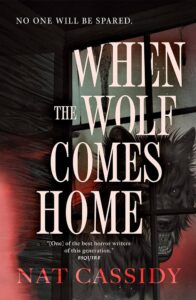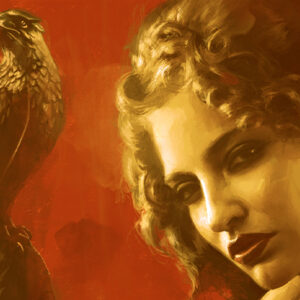When I set out to write my newest horror novel, When the Wolf Comes Home, I knew a few things. I knew I wanted it to be as fast-paced and adrenaline-fueled a chase story as any I’d ever read; I knew I wanted it to be about shapeshifters and fathers and other incomprehensible creatures; and, most of all, I knew I wanted it to be about Fear. Fear with a capital F. Fear as a phenomenon, as a character in our lives we all have to deal with, make space for, even sometimes learn to use to our advantage. Because the story’s premise centers around the uneasy alliance between a woman and the mysterious little boy she finds herself protecting, I knew I had an opportunity to look at Fear through both an adult’s and child’s perspectives. I could get a panoramic view of how it grows and changes and tests us . . . and how sometimes being afraid is exactly the correct way to feel.
It probably goes without saying that, as a horror writer, Fear is something of an obsession for me. It’s the thing I work every day to evoke in all its different flavors (dread! terror! startlement! unshakeable trauma! I love ‘em all!). It’s also the thing I most look forward to feeling in the stories I consume.
Is that strange, considering I’m a pretty anxious person in my day-to-day? Have been, ever since I was a little kid myself? I don’t think so. In fact, I think it’s a unifying quality amongst most horror fans in general. We’re an anxious bunch! Horror not only lets our anxieties have a place to work themselves off a little—like a dog park for the restless dread inside us—but it also affirms our suspicions that the world is a scary place where bad things happen. And sometimes, our stories teach us, the only thing to do with Fear is learn to live with it.
Here, then, are some books with similar preoccupations as Wolf—not just books that induce fear, but books that specifically examine the phenomenon of Fear itself. Some are tragic and cautionary tales. Others are more heroic. But they all shine light on that dreadful feeling we’re forced to reckon with whenever we’re truly all alone in the dark . . .
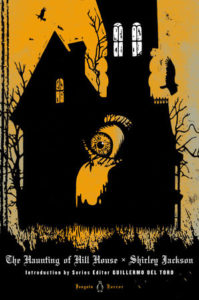
The Haunting of Hill House, by Shirley Jackson
Look, I’ll always welcome an opportunity to wedge this brilliant, landmark novel into a conversation—but in this context, it’s absolutely warranted. One of the (many) things that makes Shirley Jackson’s masterpiece so timelessly effective, so capable of surviving the decades upon decades of analysis and praise, is, despite its appearances, it’s not about a haunted house at all. It’s about one unfortunate woman’s neuroses, her all-consuming fears and anxieties and how they react to the possibility of supernatural phenomena. Jackson manages to both subvert and fulfill our expectations in the most satisfying ways. Is Hill House even actually haunted? Or is the titular haunting the cloud of dread and disaster Eleanor herself brings to it upon arrival? Do excesses of fear and worry make us ghosts before we’re even dead yet?
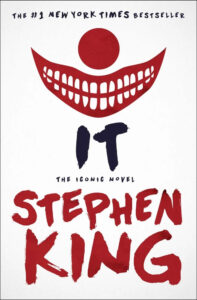
It, by Stephen King
Fear as a condiment. You can boil the entirety of King’s 1100-page magnum opus down to that one simple idea. You’d be wrong to do it . . . but you wouldn’t necessarily be incorrect. Because for all the memorable characters and set pieces and details and backstories and observations about childhood and monsters and memory and friendship and the differences between the 1950s and the 1980s and success and failure and love and heroism and the decay of the American small town and and and . . . that’s ultimately what King’s killer clown is all about. Your worst fears are nothing more than smoked paprika to good ol’ Pennywise—and there’s a primal, visceral suspicion encoded into our very DNA: what if I’m nothing more than just a tasty little morsel for something much bigger than me to eat?
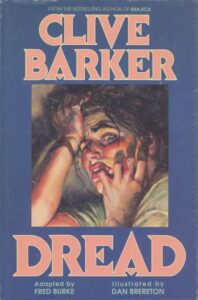
“Dread,” by Clive Barker
In a milestone short story collection (or collections, really, since there are six volumes of the Books of Blood and each one is as indispensable as the last), replete with the most ghoulish, garish, psychedelic, abso-friggin-baroque monstrosities and mutations ever put to page, it says a lot that “Dread” is still often cited as one of the strongest and most memorable installments contained therein. There are no multi-phallused demigods or Candymen or body-goliaths striding across the countryside here; just two men discussing the philosophy of dread, only for it to be revealed that one man is conducting experiments on people, exposing them to their greatest fears. That’s no spoiler, since there are plenty more twists to come, but overall it’s still the most mundane, spectacle-free story you’re gonna find from this author. And yet it’s still utterly terrifying. It’s Clive Barker by way of Hitchcock (or perhaps vice versa) and it cautions us that fear is a combustible fuel source; show it respect and handle with care.
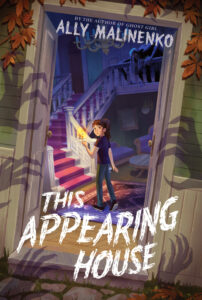
This Appearing House, by Ally Malinenko
Sometimes fear isn’t the feeling you feel right before the bad thing happens . . . it’s the feeling you carry with you for the rest of your life after you survive it. And that bad thing doesn’t have to be some near-miss with a guy with a chainsaw; it can be the very real, very quiet understanding that your body can betray you. Call it PTSD, call it growing up. Either way, it’s a form of fear that can be both inescapable and all-consuming. That’s the premise of Ally Malinenko’s brilliant middle grade haunted house novel, in which a brave young girl named Jac is nearing the fifth anniversary of her cancer diagnosis, after a long but hopefully successful treatment regimen. She’s starting to exhibit strange symptoms, which may be related to disease recurrence . . . or may be related to the mysterious house that’s just appeared in her neighborhood, which she’s determined to explore. This book might sound heavy—and it can be at times—but Malinenko keeps the narrative grounded in Jac’s sense of determination to feel fear, but not be consumed by it. An important lesson for readers of any age.
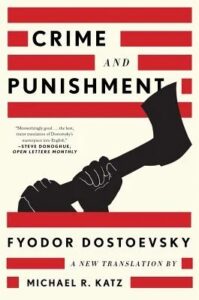
Crime and Punishment, by Fyodor Dostoevsky
Because that’s the thing about fear (and this was a big part of what I wanted to depict in When the Wolf Comes Home): it can be insidious. It’s not always a big fight-or-flight flashbang that hurtles your heart into your throat and turns your rib cage into a steel drum. Sometimes it slithers. Sometimes it creeps. Sometimes . . . it wears disguises. Raskolnikov is convinced of his own superiority. He’s a good person. A smart person. A rational and morally correct person. But it doesn’t take much to see that, really, he’s just terrified of his own meaninglessness. His belief that he’s superior to any common murderer leads him to conduct a little experiment, which involves him murdering a pawnbroker . . . and then an unexpected witness. But if he’s such a smart, rational guy, he shouldn’t need to worry about feeling guilt or getting caught, right? Little by little, fear disrobes its pretenses, and, like a good Poe story (another author OBSESSED with fear and anxiety and who could have any number of stories in this list), our hero begins to crack. It’s not just his fear of punishment, though. It’s his fear of true self-knowledge: that he is as meaningless and unexceptional—and as needing of salvation—as anyone else. There’s a wide gulf between contemplation and experience, and it’s deep enough to drown in. Dostoevsky’s 1866 masterwork is a lot of things—including, some might be delighted to discovery, a sort of proto-Matlock—but, as a prolonged exercise in one man’s nightmarish journey into fear, it’s a reminder that rationality is no match for emotion. You can’t just think your way out of terror.

Bird Box, by Josh Malerman
“Just don’t look. Whatever you do. Don’t. Look.” The answer to most people’s fear response since we first grew eyelids. But sometimes, even when you know you mustn’t . . . you still have to look. Fear evolved with us as a survival tactic to keep us alive in the midst of threat. But a strange death drive evolved with us, too. A curiosity that fear can’t always override. And it’s that doomed tension which pulls the strings taut enough for Josh Malerman to play in his iconic hit. Sometimes, as that primal instinct is constantly trying to remind us, facing your fear in the wrong kind of way can also mean your doom.

Macbeth, by William Shakespeare
“Full of scorpions is my mind.” We’ve all had nights like that, right? Nights where the thoughts won’t cease? Those “cursed thoughts which nature gives way to in repose?” I discuss in the afterword of Wolf how, in my early twenties, I went through a period of intense anxiety attacks and intrusive thoughts. I was marinating in capital-F Fear—a kind which I’d never experienced before. But it was actually doing a production of Macbeth which finally started to pull me out of that awful spiral. As is so often the case, Shakespeare articulated something I didn’t yet have the language for and helped shrink what I was feeling down into a more manageable size. Granted, in my case, I was just experiencing a severe form of seasonal affective disorder, I wasn’t roiling in guilt over committing regicide and kickstarting a series of murders to keep my ambitions safe . . . but still, there was something helpful in realizing that I wasn’t the only person who had ever experienced these strange bouts of waking night terrors. (Hell, watching Macbeth and his wife’s Fear-riddled downfall every night also helped put my own lack of transgressions into perspective.)
As with The Haunting of Hill House, I’ll always look for an excuse to cram a little Shakespeare into a conversation, too. (Sue me; as a once-and-forever classical actor, it’s my vocation, and ‘tis no sin to labor in my vocation.) But also as with The Haunting of Hill House, this isn’t some arbitrary pick here; Macbeth is out-and-out Shakespeare’s most capital-H Horror-coded play, and it’s all about Fear—so much so that we don’t even dare speak its name in a theater. Similar to Crime and Punishment, the Scottish Play is a story about the corrosive powers of anxiety and guilt, but unlike Dostoevsky’s novel, Shakespeare leans fully into supernatural manifestations. Ghosts, witches, twisted prophecies, phantom daggers, phantom bloodstains, moving forests, even the Greek Goddess of Witchcraft herself (depending on whether you believe the Hecate scenes weren’t added later by another author). Sure, many of these manifestations have potentially rational explanations, but when they’re still overwhelming enough to make Lady Macbeth, one of the flintiest characters in Shakespeare’s canon, ultimately throw herself off of a tower to escape them, those explanations do nothing to soften the blow. Macbeth is a nightmarish story about how, in the end, no matter how high you climb, you’re only ever left with your thoughts when the lights go out, and while your worst sins are creeping ever closer for payback, there are forces laughing at your anguish as you twist. In some ways, that’s actually the more optimistic interpretation! What if, as Macbeth himself posits, fear is simply our natural state as mortal detritus blowing about in the maelstrom of happenstance, and there are no real lessons to be learned because life is a tale told by an idiot, full of sound and fury, signifying . . . nothing?
I guess in that case, there’s nothing to do but screw our courage to the sticking place and try to enjoy the ride as best we can.
Maybe with a scary story or two to pass the time?
***


